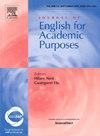讨论学科写作的局限性:自我报告的局限性和自我辩护
IF 3.4
1区 文学
Q1 EDUCATION & EDUCATIONAL RESEARCH
引用次数: 0
摘要
虽然承认研究的局限性可能具有挑战性,但对它们进行坦诚和公正的讨论可以展示科学诚信并促进学术进步。然而,很少有研究调查不同学科的作者如何以相似或不同的方式承认和证明他们的研究文章(RAs)的局限性。因此,本研究旨在分析来自不同领域的RA作者如何自我报告和证明局限性,以及他们如何使用元话语来修辞地调解这些讨论。在历史、管理学、生物学和医学四个学科的400个RAs语料库中,通过对限制步骤的句子级注释和基于语料库的立场和参与标记的一致性,该研究确定了学者们设法保持研究透明度和使限制合法化的方式的显著差异。统计和文本分析显示,在讨论内部和外部效度的限制以及关于未来研究前景、后续措施和情境约束的自我证明方面,存在显著的跨学科差异。在纯粹学科和应用学科之间,立场标记的使用也存在差异,在软科学和硬科学之间,参与标记的使用也存在差异。观察到的可变性反映了不同学科的知识实践、认识论取向、作者入侵水平和读者意识。本文章由计算机程序翻译,如有差异,请以英文原文为准。
Discussing limitations in disciplinary writing: Self-reported limitations and self-justifications
While acknowledging research limitations can be challenging, a candid and unbiased discussion of them exhibits scientific integrity and promotes academic progress. However, few studies have examined how writers across different disciplines might acknowledge and justify limitations in their research articles (RAs) in similar or divergent ways. This study, therefore, aims to analyze how RA writers from different fields self-report and justify limitations and how they use metadiscourse to rhetorically mediate these discussions. Drawing on the sentence-level annotations of limitation steps and corpus-based concordance of stance and engagement markers in the corpus of 400 RAs sampled from four disciplines—History, Management, Biology and Medicine—the study identified significant differences in the ways that scholars managed to maintain study transparency and legitimize limitations. Statistical and textual analyses revealed notable cross-disciplinary differences in the discussion of limitations pertaining to internal and external validity, and self-justifications regarding future research prospects, follow-up measures and situ-constraints. There were also discrepancies in the use of stance markers between pure and applied disciplines, and divergences in the use of engagement markers between soft and hard sciences. The observed variability reflects the distinct knowledge practices, epistemological orientations, levels of authorial intrusion and reader awareness across disciplines.
求助全文
通过发布文献求助,成功后即可免费获取论文全文。
去求助
来源期刊

Journal of English for Academic Purposes
Multiple-
CiteScore
6.60
自引率
13.30%
发文量
81
审稿时长
57 days
期刊介绍:
The Journal of English for Academic Purposes provides a forum for the dissemination of information and views which enables practitioners of and researchers in EAP to keep current with developments in their field and to contribute to its continued updating. JEAP publishes articles, book reviews, conference reports, and academic exchanges in the linguistic, sociolinguistic and psycholinguistic description of English as it occurs in the contexts of academic study and scholarly exchange itself.
 求助内容:
求助内容: 应助结果提醒方式:
应助结果提醒方式:


